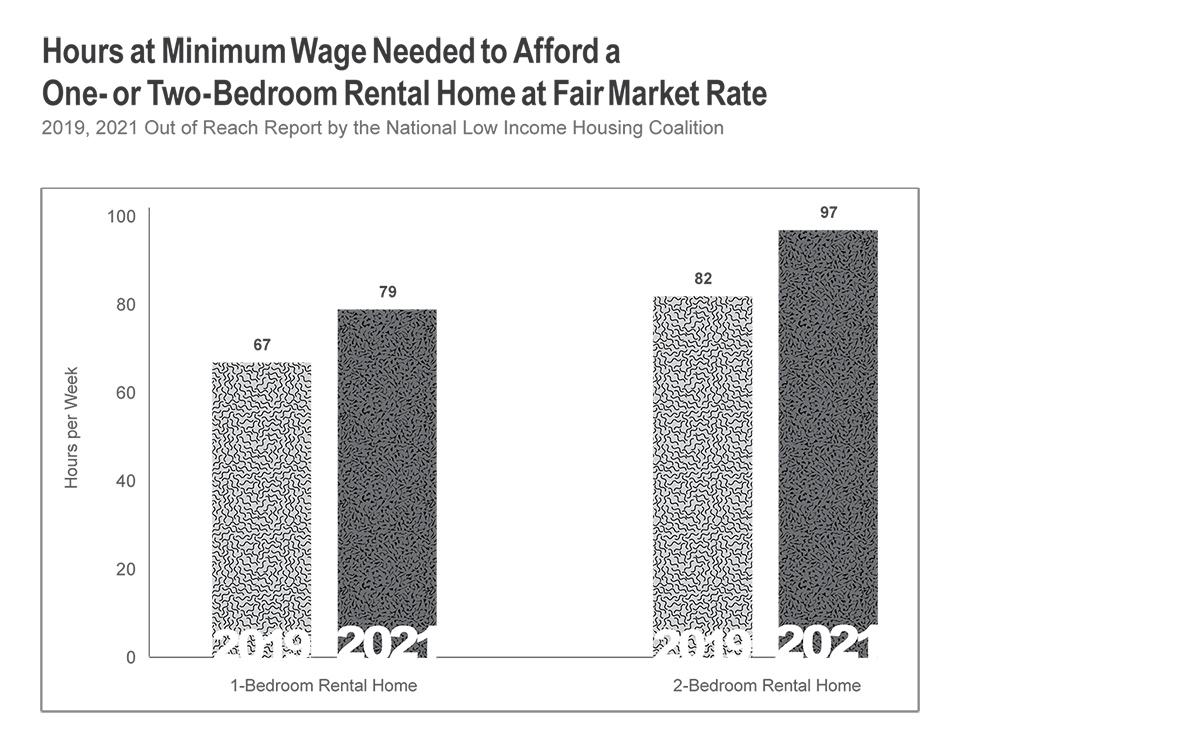Despite a global pandemic that stalled the economy and resulted in widespread unemployment, the average wage needed to afford rent in Oregon rose again in 2020, according to the National Low Income Housing Coalition’s “Out of Reach” report released July 14.
In order to spend no more than 30% of one’s total wages on rent, the portion recommended by the U.S. Office of Housing and Urban Development used to calculate a “housing wage” in the report, the average Oregon renter would need to make $25.14 per hour for a two-bedroom home. Two years ago, the figure produced by the National Low Income Housing Coalition was $22.97. In that time, Oregon has risen from 14th in the nation for the largest disparity between average wages and housing wages to 11th.
Even the lower housing wage calculation from 2018 is significantly higher than Oregon’s standard minimum wage of $12.75, meaning many workers just aren’t earning enough to pay rent — and the disparity is only growing. Since the report on 2018 data was released, the minimum wage in Oregon has increased by $1.50, while the needed wage for a two-bedroom apartment has increased by $2.17.
The gap between the minimum wage and housing wage in Oregon isn’t limited to two-bedroom homes. For a one-bedroom rental in Oregon, the housing wage is $20.83, meaning someone making a $12.75 minimum wage would need to work 65 hours a week to afford a modest one-bedroom rental at the $1,083 “fair market rent,” according to the report.

The “Out of Reach” report found the problem is even more drastic in the Portland metropolitan area, where the average wage needed for a two-bedroom rental is $29.54. The average housing wage outpaces the $14 minimum wage in Portland, by $15.54, compared to the $12.39 state average.
In addition to Oregon having one of the most expensive rental markets in the nation, the availability of affordable housing for Oregonians with “extremely low income” is below the national average, said Dan Threet, research analyst at the National Low Income Housing Coalition. While the national state average is 37 affordable and available homes per 100 extremely low-income renters, Oregon has an average of only 25 affordable and available homes per 100 extremely low-income renters.
Threet, one of the lead authors of “Out of Reach,” said the lack of available affordable housing in Oregon is symptomatic of broader national issues.
“I think part of that is a long-term structural affordability problem, and a lack of certainly federal investment, but a lack of concerted investment in building and subsidizing the kind of affordable homes that would be necessary to help alleviate the shortage at the very bottom end of the market,” Threet said.
Threet said it is “notable and troubling” that of the 30 most common occupational categories in Oregon, 21 of them have median hourly wages below housing wages.
“We’re talking about occupations like teaching assistants, cashiers, janitors and cleaners, home health aids, retail and sales people,” Threet said. “Now those positions in many states do not pay enough to be able to afford decent rental housing in their respective areas, but in Oregon, it is slightly worse than it is in many other states, insofar as there are more jobs like that that don’t pay enough to meet those housing wages.”
Oregon’s minimum wage is structured so that it is slightly higher in areas with higher costs of living, which Threet said is a somewhat hopeful sign because it shows there’s at least some sensitivity to the high cost of living. However, Threet said the main focus and takeaway of the report is highlighting the struggle of low-wage workers.
“What matters here is not just the sheer cost of rent, which is really high in Oregon, but the shortfall between rents and the wages people actually earn,” Threet said.

